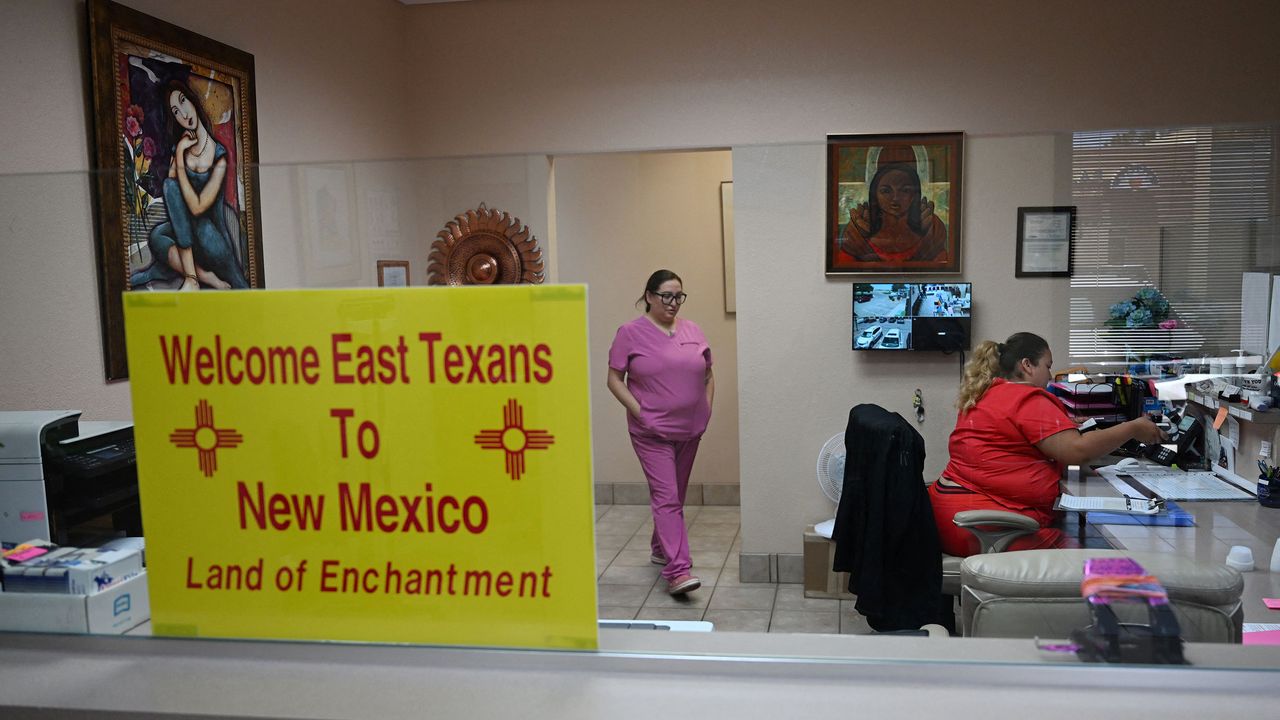When I spoke with Espey over the phone, she was on her way to Las Cruces, just a few miles from the state’s border with Texas, to care for patients at the Planned Parenthood clinic there. As demand from out-of-state patients increased, she said, clinics have opened throughout the state. “Even in Gallup, which is a much more conservative town, some very brave providers there are now providing abortion care.” Between 2020 and 2023, the number of abortions performed in the state increased by more than two hundred and fifty per cent, according to the Guttmacher Institute, which advocates for sexual and reproductive health. Most patients were from out of state, the majority of them Texans. As Texas has sought to access patients’ medical records in other states, New Mexico passed a shield law that protects such information.
New Mexico’s strong stance on abortion may seem surprising since it is more rural and more religious than much of the country. “New Mexico’s the West, not the South,” McFarlane said. “It might be religious, but it’s not as evangelical as some other states.” She also pointed out that more than half of the members of the state legislature are women, making the state second only to Nevada in terms of female representation. Lujan Grisham said she believes that the state’s high rates of poverty contribute to general support for abortion. “When you have access-to-health-care problems, as we do, it is not lost on any New Mexican how risky taking away our fundamental reproductive rights are,” she said. “And when you’re a particularly poor state, that can be much more pronounced.”
Lujan Grisham, who was elected governor in 2018, after serving a stint in the House of Representatives, has made abortion advocacy a key focus of her political career. “I was the first congressional candidate, I believe, to run on abortion care, and to use the term. Yes, it’s choice, and it’s reproductive rights, but I’m going to protect a woman’s access to and right to an abortion,” she told me. “I got a lot of pushback from a lot of folks, but, in fact, it’s why I won the election.” New Mexico allows the governor a certain amount of discretionary funding that can be spent on projects that require significant capital outlay. Lujan Grisham has allocated twenty million dollars to build reproductive-health clinics, one currently under construction in Las Cruces and another planned for northern New Mexico. “I want more abortion and abortion care available where people are, and I want more primary-care access for women and their families,” Lujan Grisham said.
Espey, who will help get the Las Cruces clinic up and running, said that it will provide “care across the women’s reproductive-health spectrum,” including contraception, basic fertility treatments, doula services, menopause care, and abortion, as well as basic primary care, immunizations, and cancer screenings. Though the clinic is intended for New Mexicans, Espey expects that many Texans will be treated there, too. Treating out-of-state patients will help with the clinic’s financial viability, Lujan Grisham told me. “They’re paying for the full cost of their care, and that’s helpful,” she said. “They can help offset losses from New Mexicans who have no coverage, or who are on Medicaid.”
Lujan Grisham is also hoping that the state’s embrace of abortion care will help attract more doctors and address the state’s long-standing shortage of health-care workers. Last year, New Mexico took out full-page ads in five Texas newspapers, urging medical professionals to relocate. “I certainly respect those of you who remain committed to caring for patients in Texas, but I also invite those of you who can no longer tolerate these restrictions to consider practicing next door in New Mexico,” the ad, framed as an open letter signed by Lujan Grisham, said. “We’re fiercely committed to protecting medical freedoms here and we’re taking steps to ensure that what happened in Texas never happens in New Mexico.”
The state’s embrace of abortion has met with some backlash. Anti-abortion groups have paid for billboards near the Texas-New Mexico border, urging women travelling for abortions to turn back. An organization called Stop the Clinic has been attempting to prevent the Las Cruces center from being built, in part by urging local companies to refuse to work on the project.
Some of the fiercest battles have taken place in the oil-field towns of eastern New Mexico, the most conservative part of the state. (In Lea County, in the southeast corner of the state, Donald Trump won eighty per cent of the vote last year.) In 2023, Laura Wight, a co-founder of Eastern New Mexico Rising, a local progressive group, spotted a flyer advertising the Texas anti-abortion activist Mark Lee Dickson’s appearance at a church in Clovis, near the Texas border. Dickson has spent the past decade urging cities and counties, mostly in Texas, to declare themselves “sanctuary cities for the unborn.” After his church appearance, Dickson spoke before the city council, urging Clovis to join the ranks of sanctuary cities. “We don’t have a clinic here. We’ve never had a clinic here,” Wight told me. Still, she saw Dickson’s lobbying as a “five-alarm fire.” In Texas, Dickson’s efforts had initially seemed symbolic—most of the self-anointed sanctuary cities were places that had never had an abortion clinic—but they eventually became part of a novel legal strategy that resulted in the state’s “bounty hunter” abortion bill, which allows private citizens to sue abortion providers.

